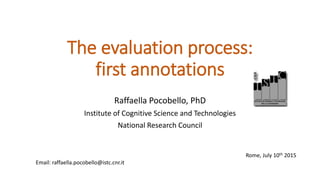
Raffaella 10 luglio
- 1. The evaluation process: first annotations Raffaella Pocobello, PhD Institute of Cognitive Science and Technologies National Research Council Rome, July 10th 2015 Email: raffaella.pocobello@istc.cnr.it
- 2. Outline This presentation will: • (1) outline the basic theoretic and methodologic concepts and • (2) offer the first results from the interviews with the eight directors of the mental health services involved in the project.
- 3. Goals of the evaluation • 1. Evaluating the transferability of the Open Dialogue method into the context of the Italian mental health services; • 2. Launching a systematic outcomes evaluation • 3. Investigating the point of views of the different stakeholders (users, family members and professionals) with respect to the OD experience.
- 4. Evaluation Theory • From Miceli and Castelfranchi’s (1989) socio-cognitive perspective, evaluations are always related to the goal of the evaluating agent (x is good / bad for what?) Stakeholder based evaluation: In multi stakeholder settings - like mental health systems - the goals of the different social agents cannot be the same for all and heavily depend on their different interests and backgrounds Participatory evaluation: The different evaluations need to be negotiated. This way the evaluation becomes a working instrument of co-responsibility.
- 5. Interviews with the eight directors of the mental health departments Analysis of structural data of the MHDs Focus groups with the professionals involved in the project Participative observations, content analysis and evaluation of the training Restitution and sharing of the results in itinere, promoting collective reasoning Evaluation of the transferability
- 6. Outcomes evaluation In line with the Finnish studies – the principal data of the project will be: a) Diagnosis b) Socio-demographic characteristics, situation at the outset and DUP (Duration of Untreated Psychosis) c) Variability of processes d) Variability of outcomes: register of number of relapses; working situation; BPRS and GAF.
- 7. “Polyphony” in research Evaluation of the processes and outcomes based on the stakeholders Study the subjective perspectives of • the patient • the family members • professionals
- 8. Towards a State of the Art The perspective of the MHDs directors
- 9. Semi-structured interviews included: a) The “psychiatric crisis” (definition, intervention strategies and use of physical restraint) b) OD as an approach (points of strength and critical issues) c) Implementation of OD d) Peer supported open dialogue? e) Other relevant issues?
- 10. a) The psychiatric crisis and the intervention approaches • Different theoretic definitions and approaches emerged with respect to “psychiatric crisis”. • Most departments do not use a specific definition of crisis • Two Italian studies on the question of crisis (Narracci, 1979 and Mezzina et al 2005) • In SPDC the main treatment is pharmacological • Differences between MHC 12 h or 24 h (hospitalization vs hospitality)
- 11. b) Open Dialogue as an approach Continuity with the cultures of the Italian services: “It appears to me an interesting theoretic scheme (…) something that belongs to the Italian psychiatry from the start of its reform with 180 (…) thus, it does not meet us unprepared (… ) Let me repeat, that the methodology and the systematization are still very much to appreciate, but the core of the intervention has been done since the beginning (…) it certainly should not be introduced as an absolute novelty to avoid the creation of antibodies - which wouldn’t be very useful!”
- 12. : Points of strengths • Change in the relationship between the medical doctor and the patient • Extension of the context “this is even more effective because done from the start, since it gives a very different message to the person as well as to the context” • Scientific quality Point of weakness “A point of weakness is that it (OD) tends to massif the response. It (od) may work well in the case of an acute psychosis but would not work so well in the case of aggressions, that is, in the case of persons which are aggressive at a psycho-pathological level.”
- 13. c) Implementing Open Dialogue Points in common: - For 3 MHDs multi-family psychoanalysis approach, - The Trieste model has many points in common with the OD: - flexibility and mobility, the concept of responsibility, the therapeutic continuity are the same - tollerance of uncertainty “ “positive assumption of risk”) But different conceptions of dialogism (as “participatory de-codification of the crisis”) and “reflective team” (as equipe meeting, reflecting on dialectic elements: e.g. control vs freedom)
- 14. c) Implementing Open Dialogue Critical issues: • Lack of personnel (in general and/or with respect to the Finnish service) • The difficulty to have a group which is dedicated exclusively to the open dialogue • The lack of young professionals (the mean age of the personnel in more that one DSM is about 55 years!) • Urban context and some proposed regional laws oriented to the control of social danger • A growing reductionist psychiatric culture over the past years
- 15. d) Peer supported open dialogue? Yes …but not now! • This is a promoted proposal, but in perspective of adequate system of support and formation. Problems: • role of the patient - or family member expert may be transformed into a real profession. Is it healthy? • resistance of the professionals • legal questions
- 16. Strategic relevance of OD in MHD now 1) Dealing with new pathologies- younger population in mixed forms and mostly secondary to the abuse of substances, characterized by a major demand on behalf of the families 2) The moment of difficulties in the territorial services: “…at the end of the empire…” • the personnel – which gets older • the change in culture, which is more and more based on the pharmacological and ambulatory treatment
- 17. Open Dialogue is needed Thank you for your attention!